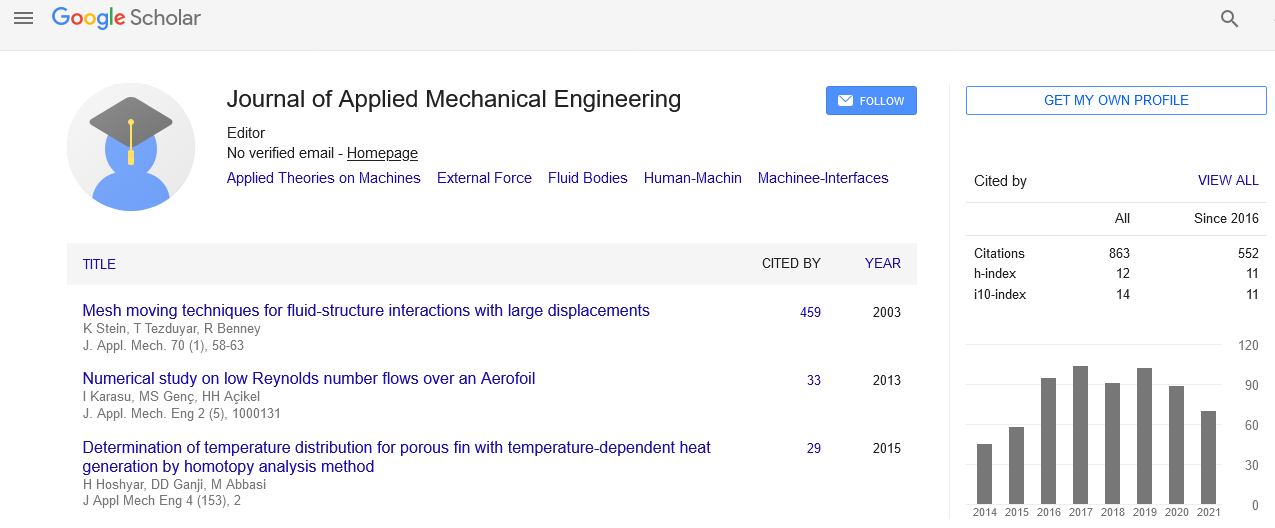Indexed In
- Genamics JournalSeek
- JournalTOCs
- CiteFactor
- RefSeek
- Hamdard University
- EBSCO A-Z
- OCLC- WorldCat
- Publons
- Google Scholar
Useful Links
Share This Page
Journal Flyer

Open Access Journals
- Agri and Aquaculture
- Biochemistry
- Bioinformatics & Systems Biology
- Business & Management
- Chemistry
- Clinical Sciences
- Engineering
- Food & Nutrition
- General Science
- Genetics & Molecular Biology
- Immunology & Microbiology
- Medical Sciences
- Neuroscience & Psychology
- Nursing & Health Care
- Pharmaceutical Sciences
Implementation of a human-machine-interaction control system in a human-robot-collaborative riveting process in aircraft assembly
Joint Event on 2nd International Conference on Advanced Robotics, Mechatronics and Artificial Intelligence & 3rd International Conference on Design & Production Engineering
December 03-04, 2018 | Valencia, Spain
Tobias Masiak, Rainer Muller and Matthias Vette-Steinkamp
Zentrum fur Mechatronik und Automatisierungstechnik gemeinnutzige, Germany
Scientific Tracks Abstracts: J Appl Mech Eng
Abstract:
Assembly processes in aircraft production are difficult to automate due to technical risks. Examples of such technical
challenges are small batch sizes, large product dimensions and limited work space. Full automation of complex processes
is expensive as it requires much effort with respect to service and maintenance. A semi-automated process, utilizing humanrobot-
collaboration, is the most effective approach for optimizing aircraft production in relation to aircraft section assembly. In
the assembly process of the aft section of aircrafts, the pressure bulk head is assembled with the section barrel using hundreds of
rivets. This assembly process is a non-ergonomic and demanding task in which two people are working together collaboratively.
Working conditions can be improved through collaboration between the operator and the robot system. The approach is
based on the process requirements as well as dynamic and skill based task sharing between the operator and the robot. This
is demonstrated by positioning a robot within section 19. The robot's task is to position the anvil tool, while the operator
performs the more complex task of inserting the rivet and operating the riveting tool. An intuitive operating is implemented
to increase operator acceptance and to enable interaction with production equipment. Within the framework of natural and
intuitive human machine interaction, smart devices are integrated to control process specific production equipment. Graphical
user interfaces in smart phones or smart watches and the integration of mixed reality technology offers new possibilities for
visualization and assistance. The developed systems allow intuitive configuration and operation of the station using an open
control concept and dynamic task sharing. The operator is therefore supported with a collaborative robot in combination with
additional assistance systems in order to improve production quality and ergonomics during the riveting process. The results
are part of the EUâ????s Horizon 2020 research and innovation programme in the four by three projects at ZeMA.
Recent Publications
1. Rainer M??¼ller, Matthias Vette, Aaron Geenen and Tobias Masiak (2017) Improving working conditions in aircraft
productions using human-robot-collaboration in a collaborative riveting process. Aero Tech Congress & Exhibition
DOI: 10.4271/2017-01-2096.
2. Rainer M??¼ller, Matthias Vette, Steinkamp, Aaron Geenen, Tobias Masiak and Ali Kanso (2017) Methodology for design
of mechatronic robotic manipulators based on suitability for modern application scenarios. International Federation of
Automatic Control - PapersOnLine 50(1):12727-12733.
Biography :
Tobias Masiak is a Research Assistant at ZeMA in human robot collaboration in the areas of aircraft production, process development as well as human machine interaction in the frame of automation and handling devices. Moreover, he is a Managing Director of a marketing agency and runs a startup as well.
E-mail: t.masiak@zema.de

